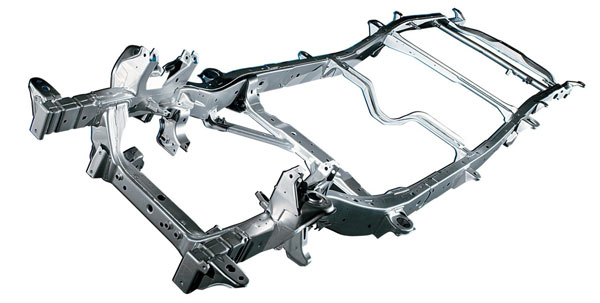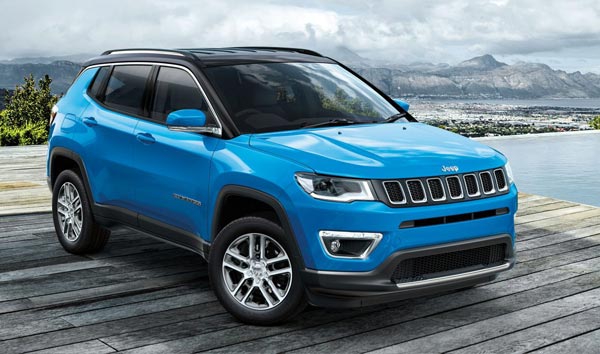Latest News
-
 Chrysler Pacifica Marks Seven Years As Most Awarded Minivan With New Campaign
Chrysler Pacifica Marks Seven Years As Most Awarded Minivan With New Campaign -
 Nissan Magnite Achieves 1 Lakh Unit Sales Milestone: Consistency Helps
Nissan Magnite Achieves 1 Lakh Unit Sales Milestone: Consistency Helps -
 Log9 Unveils Amphion & Nexmile – Revolutionizing EV Asset Management
Log9 Unveils Amphion & Nexmile – Revolutionizing EV Asset Management -
 2025 Cayenne GTS Unveiled: V8 Power And Advanced Dynamics In New Porsche Models
2025 Cayenne GTS Unveiled: V8 Power And Advanced Dynamics In New Porsche Models -
 Vanessa Williams Moderates Panel To Support Parkinson’s Awareness With Drive Toward A Cure
Vanessa Williams Moderates Panel To Support Parkinson’s Awareness With Drive Toward A Cure -
 India's Car Exports Surge In 2023-24: Maruti Suzuki Leads The Way
India's Car Exports Surge In 2023-24: Maruti Suzuki Leads The Way -
 2024 Isuzu D-Max V-Cross Facelift: What To Expect From The Latest Updates
2024 Isuzu D-Max V-Cross Facelift: What To Expect From The Latest Updates -
 Suzuki Access Electric To Electrify The Indian Scooter Market By 2024
Suzuki Access Electric To Electrify The Indian Scooter Market By 2024 -
 Bajaj Pulsar 400 Teaser Out – Launch Date & Other Details
Bajaj Pulsar 400 Teaser Out – Launch Date & Other Details -
 Tata Motors Rolls Out New Bi-Fuel Tata Magic Van, Aiming At Eco-Friendly Transportation
Tata Motors Rolls Out New Bi-Fuel Tata Magic Van, Aiming At Eco-Friendly Transportation
SUV Vs. Crossover Comparison — We Explain The Differences
SUV vs Crossover SUV comparison.
Is it a Sports Utility Vehicle (SUV)? Is it a Crossover SUV? Car manufacturers use several terms to describe their vehicles, so it's not surprising that there is more confusion than clarity about what some of the names mean.
If you are looking to buy a family car, you might be considering SUVs or crossovers. You might also be wondering: what's the difference? What are the similarities? Let's find out how SUVs and Crossovers are made differently, for different goals and why you should buy one over the other.

What does SUV stand for?
SUV stands for Sports Utility Vehicle. These vehicles look much more rugged compared to Crossover SUVs, and they are designed to be driven off-road as well on-road and usually a four-wheel-drive vehicle.
Trending Article:
Read Now - Best Road Trip Routes In India

SUVs are very sturdy vehicles, both inside and on the outside, they usually are equipped with a powerful engine, and they are not the vehicle of choice if mileage is your priority. Some of the classic examples of a full-size SUVs are Jeep Wrangler, Land Rover, Hummer, Nissan Patrol, Toyota Land Cruiser among others.
Recommended Video


What is a Crossover SUV?
A crossover SUVis a cross between a family sedan and a full-size SUV. While an SUV is based on truck chassis, the crossover is designed like a modern car, with a unibody construction. A unibody vehicle has the chassis and body bonded together.

The crossovers usually have the same ground clearance that of an SUV, and many are four-wheel-drive; however, they are built with road driving as their primary purpose and light off-road driving as a second priority. Modern crossovers usually offer better mileage compared to SUVs and have been designed to be comfortable to ride in city road conditions.

Vehicles, considered as crossovers, like the Range Rover Evoque, Audi Q3, Mercedes-Benz M-Class, and closer home in India we have the Hyundai Creta, Renault Captur and smaller crossovers such as Ford EcoSport, Maruti Vitara Brezza, and the Tata Nexon are certain examples.
Some purists consider the Mahindra XUV500, Jeep Compass, Nissan X-Trail is a crossover despite these vehicles boasting SUV capabilities.

Chassis or Platform Of SUV & Crossover
For several automobile precisionists, the difference between an SUV and a Crossover is simple: An SUV employs the platform of a truck, while the crossover is based on a car's chassis.

As mentioned above, crossovers use 'unibody' construction indicating the body and frame are one part, while SUVs utilise a "body on frame" design, meaning the body is built separately from the shell (frame) and placed together later.

When the SUV 'crossed over' to become a Crossover
In the early days, SUVs had the impression among car buyers as a vehicle which is large and offered poor mileage. Carmakers around the world started to use the term 'crossover' to describe their vehicle which moved away from the practicality of an SUV to the ride and handling, along with better mileage, of a car.

So when is it an SUV?
When the vehicle is not built through unibody construction and is a body-on-frame design, we can safely term these vehicles as an SUV.

Rugged/ Road Supremacy
Crossovers are built to handle with excellent ride quality and the convenience of a car, while SUVs are built for challenging terrain, larger payloads or even pulling duties.
A unibody designed vehicles are lighter, offer higher mileage and agility as well as a softer ride. Meanwhile, a more substantial 'body-on-frame' design is a lot more durable both regarding rust and when driven in challenging terrains.

Pros & Cons Of SUVs and Crossovers
A common misunderstanding that a more solid and rugged SUVs are safer in an accident, remarkably, the opinion maybe correct to a certain extent. In a low-speed crash, SUVs, based on their chassis don't succumb as easily as lighter crossovers.

That said, modern crossovers are engineered with several crumple zones, like a sedan, which absorbs the force of the hit and transfers less impact to the occupants. However, a more serious collision will have a massive impact on crossovers, but chances are, the occupants will have a lower incidence than a similar effect on an SUV.
An SUV is designed, primarily, to be an off-road vehicle and can usually be driven on the road as well. A crossover vehicle is mostly a cross between a sedan and a true blue SUV and can bedriven more on-road than off-road.

DriveSpark Thinks!
A crossover SUV is a vehicle that has the features of an off-road vehicle but rides and handles like a car. The SUVs are designed to take on some of the most challenging terrains and comes with a host of capable off-road features.
While crossovers can be driven for day to day activities, SUVs are more of an off-road capable vehicle to tackle some of the difficult terrains and even carry higher payloads.



 Click it and Unblock the Notifications
Click it and Unblock the Notifications















